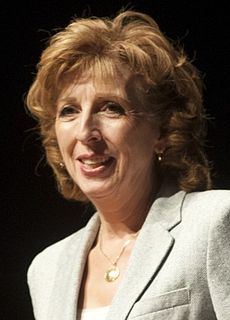The Design Automation Conference, or DAC, is an annual event, a combination of a technical conference and a trade show, both specializing in electronic design automation (EDA).
The IEEE Circuits and Systems Society is a society of the Institute of Electrical and Electronics Engineers (IEEE). It is also known by the acronym IEEE CAS. In the hierarchy of IEEE, the Circuits and Systems Society is one of almost 40 technical societies organized under the IEEE's Technical Activities Board.

The IEEE Communications Society (ComSoc) promotes the advancement of science, technology and applications in communications and related disciplines. It fosters presentation and exchange of information among its members and the technical community throughout the world. The Society maintains a high standard of professionalism and technical competency. The IEEE Communications Society is a professional society of the IEEE.
LDMOS is a planar double-diffused MOSFET used in amplifiers, including microwave power amplifiers, RF power amplifiers and audio power amplifiers. These transistors are often fabricated on p/p+ silicon epitaxial layers. The fabrication of LDMOS devices mostly involves various ion-implantation and subsequent annealing cycles. As an example, The drift region of this power MOSFET is fabricated using up to three ion implantation sequences in order to achieve the appropriate doping profile needed to withstand high electric fields.
Sir Christopher Maxwell Snowden, is a British electronic engineer and academic. He is a former Vice-Chancellor of Surrey University and of the University of Southampton. He was president of Universities UK for a two-year term until 31 July 2015 and is currently chairman of the ERA Foundation.

Linda Pisti Basile Katehi-Tseregounis is a Greek-American engineering professor and former university administrator.
RFIC is an abbreviation of radio-frequency integrated circuit. Applications for RFICs include radar and communications, although the term RFIC might be applied to any electrical integrated circuit operating in a frequency range suitable for wireless transmission.
IEEE Transactions on Microwave Theory and Techniques (T-MTT) is a monthly peer-reviewed scientific journal with a focus on that part of engineering and theory associated with microwave/millimeter-wave technology and components, electronic devices, guided wave structures and theory, electromagnetic theory, and Radio Frequency Hybrid and Monolithic Integrated Circuits, including mixed-signal circuits, from a few MHz to THz.

IEEE Microwave Magazine is a professional magazine for the members of IEEE Microwave Theory and Techniques Society that is published monthly with several special conference issues. It is also available to others as a part of the IEEE Xplore. In addition to providing societal communications to the MTT-S membership, it has regular columns giving insight into a range of technical and non-technical interests and the publication of technical feature-length articles that provide overviews and tutorials on the state-of-the-art in a given area. Currently, a typical print run is approximately 15,000 issues.
Microwave engineering pertains to the study and design of microwave circuits, components, and systems. Fundamental principles are applied to analysis, design and measurement techniques in this field. The short wavelengths involved distinguish this discipline from electronic engineering. This is because there are different interactions with circuits, transmissions and propagation characteristics at microwave frequencies.

Christophe Caloz is a researcher and professor of electrical engineering and physics at École Polytechnique de Montréal. He graduated from the Swiss Federal Institute of Technology in Lausanne, Switzerland, where he received a Diploma of electrical engineering in telecommunications in 1995 and a Ph.D in electromagnetics in 2000. From 2001 to 2004, he was a Postdoctoral Research Engineer at the Microwave Electronics Laboratory of University of California at Los Angeles, before joining the École Polytechnique de Montréal as the Canada Research Chair in radio-frequency metamaterials.

John William Bandler is a professor, engineer, entrepreneur, artist, speaker, playwright, and author of fiction and nonfiction. Bandler is known for his invention of space mapping technology and his contributions to device modeling, computer-aided design, microwave engineering, mathematical optimization, and yield-driven design.
Arye Rosen is Academy Professor of Biomedical and Electrical Engineering in the School of Biomedical Engineering, Science and Health
The Institute of Electrical and Electronics Engineers sponsors more than 1,600 annual conferences and meetings worldwide. IEEE is also highly involved in the technical program development of numerous events including trade events, training workshops, job fairs, and other programs.
Optimization Systems Associates (OSA) was founded by John Bandler in 1983. OSA produced the first commercial implementation of space mapping optimization to enhance the speed and accuracy of engineering design. OSA’s primary thrust was in computer-aided design (CAD) and simulation and optimization of radio-frequency and microwave circuits and systems. Its products included developments of Bandler's space mapping concept and methodology, which facilitates effective modeling and design optimization of computationally intensive engineering systems.
Nuno Borges Carvalho from the Universidade de Aveiro, Aveiro, Portugal was named Fellow of the Institute of Electrical and Electronics Engineers (IEEE) in 2015 for contributions on characterization and design of nonlinear RF circuits.
Natalino Camilleri from the Nitero, Inc., Austin, TX was named Fellow of the Institute of Electrical and Electronics Engineers (IEEE) in 2015 for leadership in radio frequency integrated circuits and systems.

Stepan Lucyszyn FIEEE is a British engineer, inventor and technologist, and Professor of Millimetre-wave Systems at Imperial College London, England. He was named a Fellow of the Institute of Electrical and Electronics Engineers (IEEE) in 2014. Lucyszyn's research has been on monolithic microwave integrated circuits (MMICs), radio frequency microelectromechnical systems, wireless power transfer (WPT), thermal infrared technologies and additive manufacturing.
Rhonda Franklin is a Professor of Electrical and Computer Engineering at the University of Minnesota. She is a microwave and radio frequency engineer whose research focuses on microelectronic mechanical structures in radio and microwave applications. She has won several awards, including the 1998 NSF Presidential Early Career Award for Scientists and Engineers, the 2013 Sara Evans Leadership Award, the 2017 John Tate Award for Excellence in Undergraduate Advising, and the 2018 Minnesota African American Heritage Calendar Award for her contributions to higher education.




